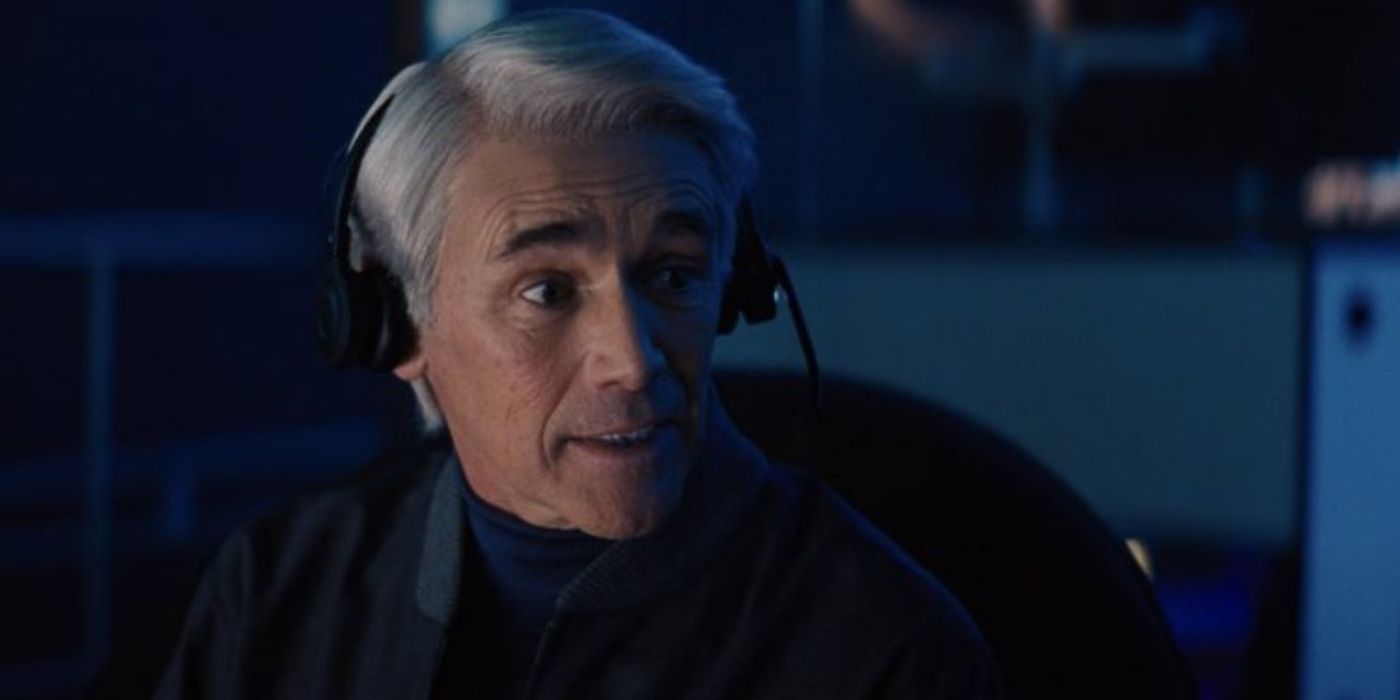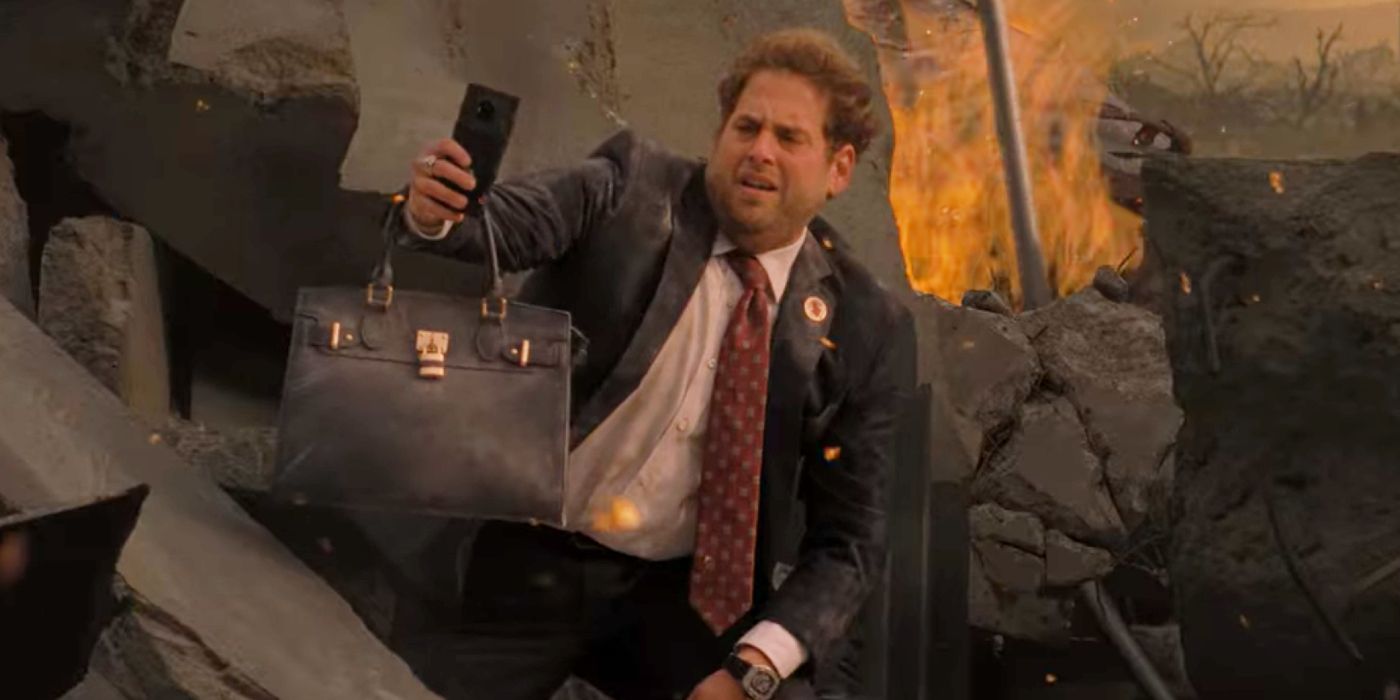Warning: the following contains SPOILERS for Don’t Look Up.
Don’t Look Up, director Adam McKay’s star-studded sci-fi political satire, takes aim at several of the key problems plaguing modern society, which has prompted various interpretations of what the movie really means. After a string of movies that helped steer Hollywood’s comedic voice in the last decade, McKay first treaded into the waters of dark political comedy through films like Vice and The Big Short. Although Don’t Look Up is not a true story, its main characters are based on real people, and for most viewers, the events certainly hit close to home. In Don’t Look Up, McKay further dissects the shortcomings of modern capitalist society, tech addiction, and humanity’s impending doom.
Don’t Look Up follows astronomers Kate Dibiasky (Jennifer Lawrence), Dr. Randall Mindy (Leonardo DiCaprio), and Dr. Teddy Oglethorpe (Rob Morgan) as they try and ultimately fail to warn a distracted global population about a planet-killing comet that will collide with Earth in 6 months and 14 days. Standing in their way are U.S. President Janie Orlean (Meryl Streep), her son and White House Chief of Staff Jason Orlean (Jonah Hill), and billionaire BASH CEO Peter Isherwell (Mark Rylance), who derail the initial plan to use remote explosives to blow the comet off its course. Ignoring the advice of scientists not on his payroll and essentially causing Don’t Look Up’s bleak ending, Isherwell tries and fails to mine rare minerals from the comet and shatter it into several harmless pieces, allowing Dibiasky Comet to end all intelligent life on Earth. Elsewhere and thousands of years into the future, Isherwell, President Orlean, and several other billionaires wake up from cryogenic sleep, walk out of BASH’s escape ships, and onto the unspoiled green surface of an oxygen-rich alien world.
Don’t Look Up is about how the billionaires in power, despite having the resources and technology to do almost literally anything, still choose to pursue becoming trillionaires over saving the lives of the other 7.9 billion people on the planet. It’s also about the dopamine hold that smartphones have over the human brain, how the modern big data-driven news cycle has ironically enabled mass distrust in peer-reviewed data, as well as how humanity is failing to adequately respond to the unfurling climate crisis. From the hidden details and the overt political metaphors to Don’t Look Up’s hilarious post-apocalyptic credits scenes, here are the key messages of the movie that could go down in history as Adam McKay’s magnum opus.
Don’t Look Up From Your Phones
The smartphone is a crucial part of the narrative in Don’t Look Up. BASH, the corporation that dooms Earth, is a telecom and big data company. In the end, the first thing that Jason does, upon thinking that he’s the last man on Earth, is to open his phone and post a new story. Orlean’s “Don’t Look Up” campaign isn’t just about ignoring Dibiasky Comet. It’s a literal command to the viewer to not look up from their phones, because why would they, when everything they need is right there? This is a key aspect of why Don’t Look Up might be McKay’s best movie. Phones make it easier to ignore the giant comet that’s headed straight for Earth, which is a metaphor not just for climate change, but also for any impending disaster or unaddressed political reality. At the same time, Kate uses a dieting app to keep track of when Dibiasky Comet will hit. In short, there’s no escaping smartphones. And in the end, our increasing dependence on these devices enables the actions of billionaires who have a history of choosing profit over human lives.
The Giant Comet Is Not Just About Climate Change & COVID
The giant comet is a metaphor for the harsh realities and peer-reviewed scientific facts that memes, talk shows, and other forms of entertainment allow society to ignore – universal themes that apply to more than the burgeoning climate crisis and COVID-19 pandemic. Don’t Look Up makes it a point to draw importance to the value of peer review and show how scientific voices are being drowned out by the entertainment news cycle. As Tyler Perry’s Jack Bremmer and Cate Blanchett’s Brie Evantee paint Jennifer Lawrence’s Kate Dibiasky as a crazy doom prophet, the scientist’s astronomical findings get discredited as well. At the same time, through Ishwell’s plan to mine Dibiasky Comet, the movie also shows how even well-respected scientists can be bought. Despite not being based on any real events, Don’t Look Up accurately depicts the information war between online pundits and personalities in the digital age, including how those who side with the truth are losing this war.
BASH, Peter Isherwell, And Billionaire Vanity Projects
Mark Rylance’s Peter Isherwell represents every billionaire and technocrat who got richer during the pandemic. There is no doubt that Isherwell is a pioneer, and likely has contingency plans to survive on the seemingly hostile alien planet that his ships landed on. That being said, Isherwell’s escape ship was reserved for only the richest people on Earth, which is just one of his many selfish decisions, all of which are why Don’t Look Up ranks among 2021's best comedies. In fact, the way Isherwell can predict people’s deaths through data mining shows that he knew that there was a high risk for his comet-mining mission to fail and doom humanity – but he did it anyway. Moreover, as Jason doesn’t complain that there’s no service during the post-credits scene, BASH’s internet still seems to work even after the apocalypse. In short, while it’s true that some billionaires possess genius-level intelligence and foresight, it’s probably not a good idea to allow the people who can hoard the most money to decide humanity’s fate.
Don’t Look Up Is The Disaster Movie The World Deserves
Don’t Look Up is what Mike Judge’s Idiocracy tried but failed to be – a star-studded political satire that non-condescendingly dissects the state of the average human brain in the age of capitalism. Don’t Look Up breaks the disaster movie genre down to its sociopolitical roots – a big leap forward in the evolution of the tired genre. Although Don’t Look Up’s characters and story are entirely all made up, there’s nothing fictional about the decisions they make and the possibility of a bleak future for humanity.





